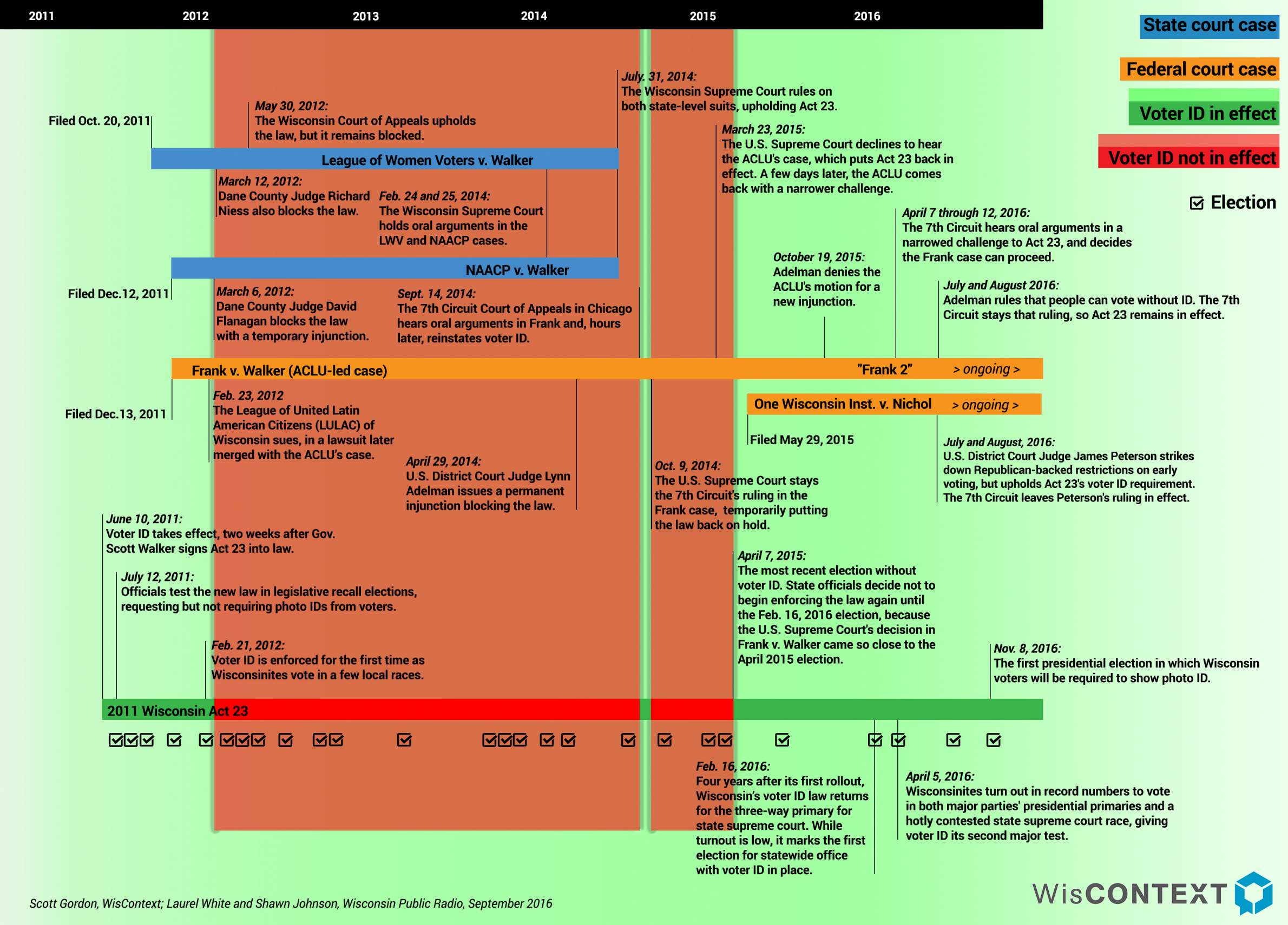
Visualizing Wisconsin's Voter ID Lawsuits So Far

Wisconsin's voter-ID requirements, signed into law in 2011 as Act 23, is a signature agenda item for Gov. Scott Walker and the state legislature's Republican majority. But its passage set off more than five years of wrangling in the courts — a struggle that has yet to be settled.
The state's voter ID law has faced two state-level lawsuits and multiple federal suits since 2011. These lawsuits have challenged the law on constitutional grounds.
At the state level, those challenges ended in July 2014, when the Wisconsin Supreme Court ruled in favor of the law in two cases, League of Women Voters v. Walker and Milwaukee Branch of the NAACP v. Walker. In federal court, the status of those three suits are far more tangled, with different levels of circuit and appellate judges batting the constitutionality of Act 23 back and forth, affirming some components of the law while invalidating others, alternately enjoining and upholding the law.
To make things even more complicated, one federal lawsuit, the American Civil Liberties Union-backed Frank v. Walker, died and came back to life. The United States Supreme Court declined to hear the case in March 2015. That usually spells the end of a lawsuit, but the ACLU succeeded in petitioning lower courts to revisit a more narrowly focused version of the Frank challenge. Another federal suit, One Wisconsin Institute v. Nichol, also remains up in the air.
As a result, Wisconsin's voter ID law hasn't actually been in effect for many elections. When voter ID has been required — most notably in the record-turnout presidential primary and state supreme court election on April 5, 2016 — it has been with different conditions and exceptions in different elections.
The Voter ID law will be in effect on Nov. 8, when Wisconsinites vote for president and decide a bitterly fought rematch between Sen. Ron Johnson and former Sen. Russ Feingold. One thing that's new: As a result of the legal battles over Act 23 and other election laws in Wisconsin, at least some voters will experience the earliest early-voting dates in state history. (Residents who haven't voted early before can learn about the process in a Wisconsin Public Radio guide).
In Wisconsin and nationally, more voters and commentators — and more importantly, judges — have become increasingly convinced that voter ID laws are a Republican-supported ploy to suppress voters in college, among communities of color and others more likely to support Democratic candidates. Meanwhile, people supporting ID requirements continue to insist there's a widespread problem with voter impersonation, but have yet to turn up strong evidence of it happening. A onetime staffer for former Republican state senator Dale Schultz explosively asserted in April 2016 that GOP lawmakers openly talked about targeting minority and college-aged voters while crafting Wisconsin's voter ID law. Meanwhile, North Carolina's voter ID law, seen as one of the most stringent in the nation, was struck down in August by the divided U.S. Supreme Court.
The future of Act 23 is in the hands of federal appellate and circuit court judges in Frank v. Walker and One Wisconsin Institute v. Nichol. The visualization at top and an interactive timeline explain how Wisconsin and its voters arrived in this position.
Editor's note: Wisconsin Public Radio capitol reporter Laurel White and capitol bureau chief Shawn Johnson contributed to the reporting presented in the graphic about lawsuits challenging Wisconsin's voter ID law.


